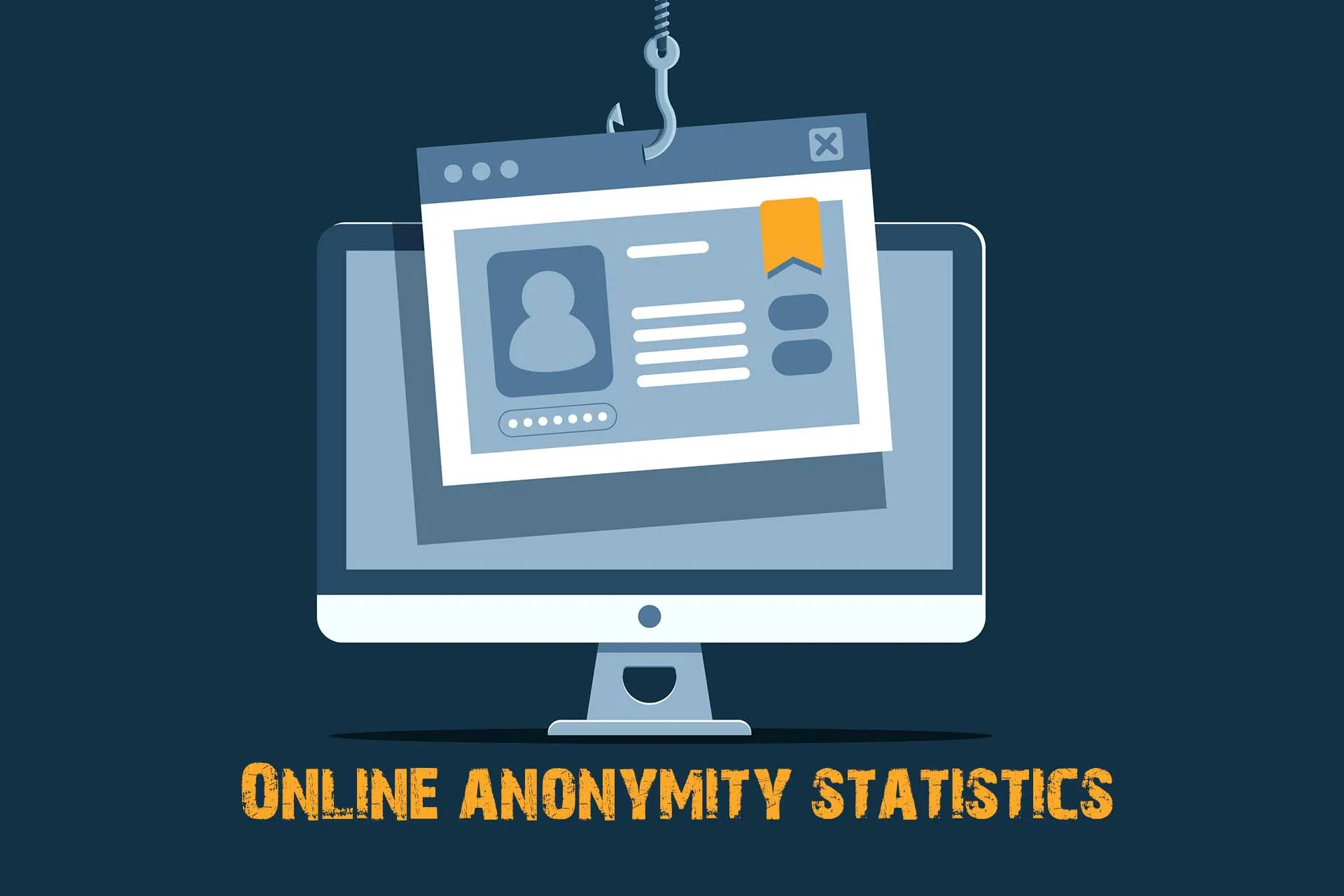14 Eye-Opening Online Anonymity Statistics to Know in 2026

Online anonymity has become a significant concern for people worldwide.
It’s the ability to use the internet without revealing your true identity, allowing you to maintain privacy and protect your personal information.
It can help reduce the impact of online surveillance and data collection by governments and corporations, preserving individual privacy rights.
Balancing the benefits of online anonymity with the potential risks is an ongoing challenge.
But with the increasing amount of personal data being shared and collected online, understanding the current state of online anonymity is crucial.
So, let’s get into the latest online anonymity statistics to glean insights into user behavior, privacy concerns, and the tools people use to protect their online identity.
Interesting online anonymity statistics
As you’ll see, online privacy is quite a complex issue:
- 32% of young internet users are worried about the misuse of their personal data.
- 71% percent of all countries have established legislation regarding protecting online privacy.
- 51% of US internet users use “incognito” or “private” mode when they want to keep their search history hidden.
- 35% of people in the US use Virtual Private Networks (VPNs) to access the internet.
- While being one of the safest browsers, DuckDuckGo has a market share of only about 0.88%.
- Estonia is the top country for protecting internet user rights with a score of 37, while China sits at the bottom with 0.
How users perceive online anonymity
To better understand the current state of online anonymity, let’s explore some general statistics related to user behavior and privacy concerns.
1. 57% of internet users find it impossible to protect their privacy online
(Source: Statista)
The collection of data by popular search engines and browsers Google Chrome has led many people to believe that online privacy is virtually impossible.
2. 63% of users worldwide say they accept certain risks to their online privacy for the sake of convenience
(Source: Statista)
Another major challenge in the way of online anonymity is the convenience barrier set by internet industry giants.
For example, the popularity of Google accounts for syncing accounts on various platforms and services has driven many users to relinquish their privacy rights.
3. 32% of people aged 16 to 25 are concerned about the misuse of personal data
(Source: GWI)
The concern for the misuse of personal data (ranging from simple identifications like names to advanced data like search patterns) is not as high as one might think.
This becomes more alarming since it has dropped from 33% in the GWIs 2020 survey to 32% in 2022.
4. US internet users now believe online privacy protection is more of a consumer responsibility
(Source: Consumer Reports)
According to a Consumer Reports survey, back in 2020, US internet users were more inclined to hold companies responsible for protecting their privacy and data.
The share of users holding this view saw a drastic drop in 2022 when a survey revealed a decrease from 42% to 32%.
This means that more users now think that online privacy and anonymity can not be taken for granted, and they should personally step forward and protect themselves.
5. 30% of US internet users believe they don’t have anything worth stealing online
(Source: Consumer Reports)
Protecting your personal information and data online is not just for avoiding commodity theft, but it can prevent other critical problems like identity theft.
Having personal information, such as your phone number, home address, social security number, etc., available to the wrong people can have serious ramifications.
6. About 75% of US internet users are concerned about the privacy of personal data collected online
(Source: Consumer Reports)
Surprisingly, the level of concern regarding the privacy of personal data collected online is relatively high in the US.
However, only 24% of users were reported to be very concerned over this matter, and around 2% didn’t know that their data was being collected in the first place.
7. 45% of US internet users are at least somewhat confident their personal data is private
(Source: Consumer Reports)
Apparently, the general consensus regarding the privacy of personal data over the internet is still not decided between US consumers.
The personal data in question here is users’ social security number, health history, and financial information.
Privacy concerns by country
Different countries have varying levels of concern about online privacy. Let’s examine some online anonymity stats related to privacy concerns in various countries.
8. 137 out of 194 countries have come up with legislations to ensure data and online privacy protection
(Source: UNCTAD)
The concern for protecting data and privacy online has prompted governments all around the world to come up with supporting legislation.
9% of the countries worldwide have draft legislation, while 15% have no legislation in this regard.
9. China is the worst regarding internet user rights violations, while Estonia is the best
(Source: Freedom on the Net)
Freedom on the Net reported the 2022 internet freedom scores for 70 countries. Iceland topped the list with an impressive 95% score, while China sat at the very bottom with a mere 10%.
For the sole criteria of internet user rights violation, however, Estonia proved to have the highest score of 37, with China scoring an absolute 0.
10. Australians are the most willing to take action to protect their digital privacy
(Source: Statista)
A global survey conducted at the end of 2022 saw an overall 83% of all respondents stating that they would like to take more actions to protect their privacy.
Australia was leading the pack, with around 9 in every 10 Australians wanting to take more steps for their digital privacy protection.
Privacy tools and practices
As concerns about online privacy grow, more people are adopting various tools and practices to protect their personal data online.
Let’s see what the numbers have to say:
11. DuckDuckGo has a market share of about 0.88% among all search engines
(Source: Statista)
One way to protect your data from being collected is to use privacy-focused search engines like DuckDuckGo.
DuckDuckGo is considered the leading browser in this pack, but it’s quite unpopular compared to other solutions.
12. 47% of US internet users surf in “incognito” or “private” mode
(Source: Consumer Reports)
Almost every mainstream browser offers a special browsing mode that doesn’t keep track of your search history and some other metrics.
However, it’s important to keep in mind that this is only a superficial measure of keeping your anonymity on the internet.
13. 32% of US internet users utilize Virtual Private Networks (VPNs)
(Source: Consumer Reports)
VPNs are among the most widespread methods of keeping online anonymity and privacy.
The number of people using them has grown in numbers in recent years since they provide many different benefits.
These include but aren’t limited to, encrypting your connection, hiding your true IP, and helping you circumvent geo-restrictions.
14. 57% of US internet users adjust the privacy settings in their web browser
(Source: Consumer Reports)
Privacy settings in browsers can provide basic tools for protecting your privacy.
Options such as clearing browsing data and managing cookies and site settings can be found in many browsers.
Wrap Up
The online anonymity statistics we showed you reveal a growing concern about privacy among internet users worldwide.
As more people become aware of the potential risks associated with their online activities, the adoption of privacy-enhancing tools and practices is likely to increase.
Understanding these trends can help individuals and organizations make informed decisions about how to protect their online identity and maintain their anonymity in an increasingly connected world.
Sources:
Read our disclosure page to find out how can you help VPNCentral sustain the editorial team Read more






User forum
0 messages